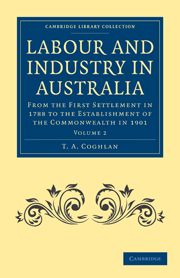 Labour and Industry in Australia
Labour and Industry in Australia Book contents
- Frontmatter
- Contents
- PART IV
- PART V FROM THE INTRODUCTION OF FREE SELECTION BEFORE SURVEY TO THE ESTABLISHMENT OF PROTECTION IN VICTORIA, AND THE BEGINNING OF A VIGOROUS POLICY OF PUBLIC WORKS IN ALL THE COLONIES
- I INTRODUCTION TO THE FIFTH PERIOD
- II IMMIGRATION
- III RECRUDESCENCE OF BUSHRANGING
- IV LAND LEGISLATION AND SETTLEMENT
- V LABOUR AND WAGES
- VI THE INTRODUCTION OF COLOURED LABOUR INTO QUEENSLAND
- VII PRICES
- VIII TARIFF CHANGES AND THE ESTABLISHMENT OF PROTECTION IN VICTORIA
- IX INTERCOLONIAL TARIFF RELATIONS
IX - INTERCOLONIAL TARIFF RELATIONS
Published online by Cambridge University Press: 05 August 2011
- Frontmatter
- Contents
- PART IV
- PART V FROM THE INTRODUCTION OF FREE SELECTION BEFORE SURVEY TO THE ESTABLISHMENT OF PROTECTION IN VICTORIA, AND THE BEGINNING OF A VIGOROUS POLICY OF PUBLIC WORKS IN ALL THE COLONIES
- I INTRODUCTION TO THE FIFTH PERIOD
- II IMMIGRATION
- III RECRUDESCENCE OF BUSHRANGING
- IV LAND LEGISLATION AND SETTLEMENT
- V LABOUR AND WAGES
- VI THE INTRODUCTION OF COLOURED LABOUR INTO QUEENSLAND
- VII PRICES
- VIII TARIFF CHANGES AND THE ESTABLISHMENT OF PROTECTION IN VICTORIA
- IX INTERCOLONIAL TARIFF RELATIONS
Summary
During the opening years of this period, trade passing across the inland borders of New South Wales, South Australia, and Victoria, remained free of customs duties under the agreement of 1860; and there was a disposition on the part of the Ministries then in office, to extend the obvious advantages of the system to the whole trade of the colonies. A conference of representatives of all the colonies was summoned to meet at Melbourne in March 1863 to discuss the question. To this conference Victoria, New South Wales, South Australia, and Tasmania sent delegates, who were not long in coming to the conclusion that complete intercolonial free trade was possible only under the conditions of a uniform tariff, applicable to all the colonies. Having reached this conclusion, the conference proceeded to draw up a customs tariff, which it was thought would meet the requirements of the situation; and the members separated, pledged to urge upon their respective Parliaments the desirableness of adopting this tariff, in place of the varying tariffs then existing. On their return home the delegates found that they had arrived at a determination at variance with the views held by the Ministries to which they belonged and by the majority of the various legislatures. The proposals were not only unheeded, but it was evident that the legislatures were disposed to travel in a quite opposite direction.
- Type
- Chapter
- Information
- Labour and Industry in AustraliaFrom the First Settlement in 1788 to the Establishment of the Commonwealth in 1901, pp. 1161 - 1167Publisher: Cambridge University PressPrint publication year: 2011First published in: 1918
